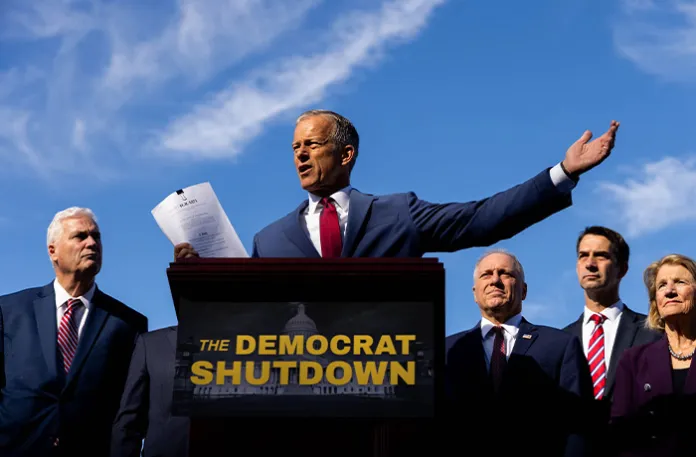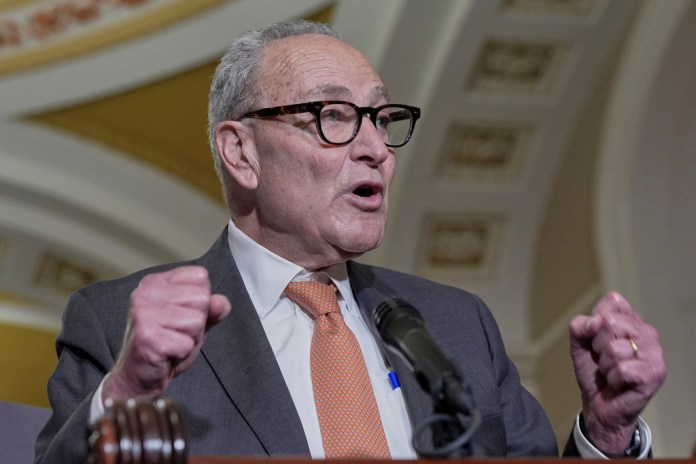Congress was no step closer to ending the government shutdown after the Senate rejected, for the fifth time, dueling short-term funding bills from Republicans and Democrats.
The chamber voted mostly along party lines, besides the same handful of defectors who have crossed the aisle in past recent votes, on the proposals to reopen the government.
A “clean,” seven-week extension from Republicans that cleared the House last month was shot down 52-42, shortly after a stopgap counter proposal from Democrats that preserves expiring Obamacare subsidies was defeated 45-50.
Sen. Rand Paul (R-KY), a libertarian and fiscal hawk, continued to oppose both, while Democratic Caucus members Catherine Cortez Masto (D-NV), John Fetterman (D-PA), and Angus King (I-ME) supported both. The votes revealed Senate Minority Leader Chuck Schumer’s (D-NY) ability to hold most of his coalition together and wield their filibuster leverage on what marked the sixth day of the shutdown.
“I’m wondering just what, exactly, Democrats think they’re gaining from all of this,” Senate Majority John Thune (R-SD). “I guess they’re getting points from the far-Left interest groups that they’ve been coordinating their shutdown strategy with.”

Due to Paul’s opposition, Republicans will ultimately need at least eight Senate Democrats to clear the 60-vote filibuster and reopen the government. But the pathway to such a scenario remained elusive, as Democrats dig in on their healthcare demands and Republicans refuse to negotiate until the government is reopened.
“If you’re not ready to solve it now, how do we know you’re going to solve it 45 days from now?” Schumer said. “Most of America, when [House Speaker Mike Johnson (R-LA)] says later, they know he means never.”
Rank-and-file members have taken it upon themselves to engage in unofficial cross-party negotiations, but leadership has yet to make attempts at compromise. Republicans are split over whether Obamacare premium subsidies set to expire at year’s end should be extended and with what modifications, while Democrats say urgent action is needed to prevent spikes in marketplace plans that open up on Nov. 1.
The Democratic short-term funding bill would make permanent the enhanced subsidies, first enacted by Democrats as a temporary pandemic-era policy, and cost around $350 billion over the next decade. It also includes other progressive priorities that are nonstarters for Republicans, such as rolling back the Medicaid changes in President Donald Trump’s tax law.
Democrats rejected comments made by Trump on Monday that there were ongoing negotiations between them and the White House.
JOHNSON BRUSHES OFF JEFFRIES’S CHALLENGE TO DEBATE ON HOUSE FLOOR
Schumer said the claim “isn’t true — but if he’s finally ready to work with Democrats, we’ll be at the table.”
Trump responded in a subsequent Truth Social post he would be “happy to work with the Democrats on their Failed Healthcare Policies, or anything else, but first they must allow our Government to re-open.”
, 2025-10-06 22:48:00,  , Washington Examiner, %%https://www.washingtonexaminer.com/wp-content/uploads/2023/11/cropped-favicon.png?w=32, https://www.washingtonexaminer.com/feed/, Ramsey Touchberry
, Washington Examiner, %%https://www.washingtonexaminer.com/wp-content/uploads/2023/11/cropped-favicon.png?w=32, https://www.washingtonexaminer.com/feed/, Ramsey Touchberry
